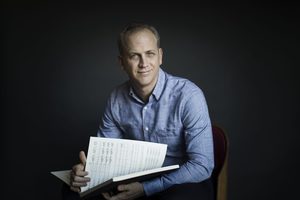What happens when five strangers riding a bus to Topeka, Kansas become stranded in a homestyle diner-turned-bus-stop with a sheriff, a confident diner owner, and an innocent high school waitress? Well, when the strangers are a bumbling bus driver, two cowboys, a troubled and egotistical philosopher, and a chanteuse marrying against her will, anything could happen!
William Inge’s Bus Stop opened Friday at Raleigh Little Theatre (RLT), telling the story of eight strangers trapped in a blizzard together. Based in the 1950’s, the story is both innocent and foreboding, with a humorous set of contrasting character types who get into enough trouble to suggest – but never truly realize – the presence of corruption. The action all takes place in Grace’s Diner, over only about four hours of the characters’ time.
The audience is immediately drawn into the action, if not by the welcoming pre-show remarks by Grace herself, then by the complimentary coffee bar in the lobby and the thrust stage. Some characters are more likable than others, but they all have endearing quirks, much like people we experience in our everyday lives. The light humor interspersed with deeper truths and explorations of the human experience make accessible some of the greater mysteries of love and the meaning of life. Grace (Connie Di Grazia) plays the down-to-earth diner owner who grounds everyone and keeps the conflicts at bay, even though she claims, “I love a good fight!”
Despite the length of the show, requiring two intermissions, the plot unfolds quickly and in unique ways, with twists and turns at every juncture. Though the conflicts are not very extraordinary and the play is firmly grounded in realism, it provides a snapshot of an extraordinary day in the lives of ordinary people. The sharp contrasts between characters makes the plot comical, but their needs and desires give it direction and meaning. The firmly rooted Midwestern Grace, paired with Northeastern bus driver Carl, played so humorously by David Klionsky, is outrageous but still makes perfect sense.
The play ends as quietly as it begins, with some conflicts resolved, others begun, and others put into new perspectives. The ending is not the end of the story, but rather the end of this moment in the characters’ lives, encapsulated by the character of Virgil, played with great depth and emotion by Jonathan Lowry.
Opening night at Raleigh Little Theatre’s “The Bus Stop” featured much more than the first performance of this play. The public-private nonprofit partnership between RLT and the City of Raleigh has been so successful in years past that city officials, arts council members, and countless RLT volunteers attended to witness the presentation of the North Carolina Theatre Commission’s 2012 Community Theatre Award. RLT Executive Director Charles Phaneuf accepted the award humbly and introduced the Raleigh Mayor Pro Tem Eugene Weeks, who gave a humorous but quite meaningful speech. The cooperation between the City of Raleigh and the arts was made especially apparent. As Weeks explained, “We [the city commissioners] all believe in the arts and what is going on in the city today.” Such feelings are not to be found everywhere, and the fact that Weeks and other city officials attended opening night speaks volumes of the cooperation of Raleigh and the arts.
Bus Stop continues through Sunday, February 24. For more information on this production, please view the sidebar.











